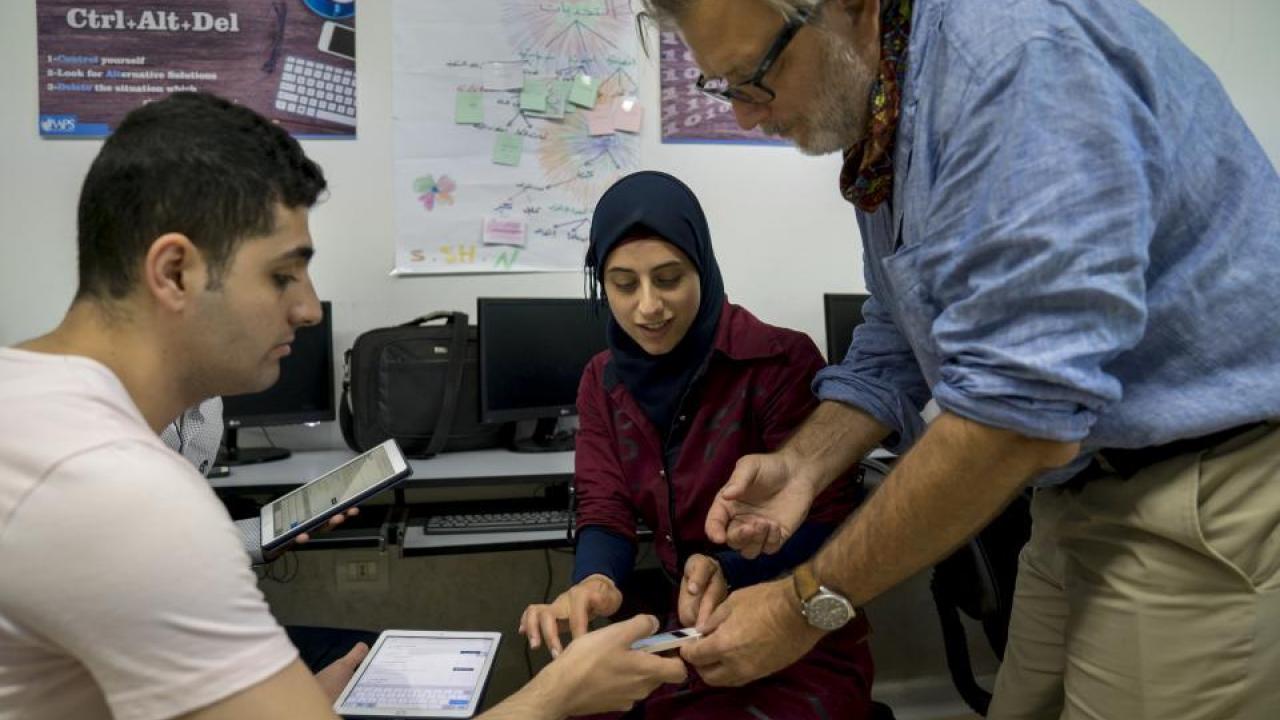
Article 26 Backpack Humanitarian Tool Now Includes Expanded Languages, New Features
UC Davis recently released an updated version of Article 26 Backpack, a digital tool and ecosystem for refugees and other displaced peoples to safely and securely curate, store, and share critical academic and career development documents with universities, possible employers, and agencies.
“Article 26 Backpack solves the problem of academic and professional document safety for refugees and other displaced peoples,” said Keith David Watenpaugh, director of Article 26 Backpack, and professor and director of Human Rights Studies at UC Davis.
“With the Backpack, young people dealing with the challenges of forced migration no longer face losing or having stolen the kinds of papers like diplomas and transcripts so fundamental to continuing their education. With Backpack they can safely share those materials across the globe with just a few keystrokes.”
Article 26 Backpack is named in accordance with Article 26 of the Universal Declaration of Human Rights, which asserts everyone’s right to education. It is a joint project of UC Davis Human Rights Studies in the College of Letters and Science and UC Davis Global Affairs, was developed with the support of the Ford Foundation and Open Society Foundation, in collaboration with the American Association of Collegiate Registrars and Admissions Officers (AACRAO) and the American University of Beirut (AUB). The first version was launched and implemented in Lebanon and California in 2018 as tool to help refugees reclaim right to education and has been used by over 1,000 young people.
Once uploaded into the Article 26 Backpack system, documents are stored in a cloud protected by the University of California and belong exclusively to the individual as information is never shared with governments or for commercial reasons.
"We built Article 26 Backpack version 1.5 on the basis of that experience and the realization that Backpack has the potential to become a standard tool in refugee support and civilian protection," said Watenpaugh.
Newly Released Features of Article 26 Backpack
- Expanded languages
- Arabic
- English
- French
- Dari/Farsi
- Spanish
- Easy sign-on: users can now sign on by themselves and more easily retrieve lost passwords
- Additional fields for materials and the My Story/My Future, a way to create an audiovisual statement of purpose using techniques borrowed from humanities field of digital storytelling. These short videos also provide a way to bring a human face to the academic documents that are contained in Backpacks.
"We’re inviting colleagues and supporters to join us in sharing information about Backpack 1.5 with eligible young people and those organizations and groups best positioned to help get spread the word of the Backpack system as a resource to eligible Spanish, French and Dari-speaking populations,” said Watenpaugh.
Additional Information: Best Practices in Using Article 26 Backpack
- Eligibility: Displaced, refugee or vulnerable young people, aged 18 and over who have completed high school or its equivalent, have attended or plan to attend higher education or advanced training, and seek to exercise their human right to education.
- At the time of initial encounter with a young person, for example when applying for a scholarship or other form of assistance, provide information about Article 26 Backpack and encourage them to use it. The tool is designed to be used with little outside help.
- Reassure eligible users of the safety, security, and universal accessibility of documents. Encourage them to read the Article 26 Backpack privacy policy. Article 26 Backpack provides an opportunity for those working with eligible individuals to engage in a conversation about career opportunities and goals, while also bringing heightened security to their documents.
- Offer assistance in the preparation of the My Story/My Future audiovisual statement of purpose component of Article 26 Backpack.
- Additional information, including materials on how to train young people to reach out to others through social media, is included at backpack.ucdavis.edu.
About Global Affairs at UC Davis
Global Affairs brings the world to UC Davis, welcoming more than 10,000 international students, scholars and leaders, and hosting programs that inspire global curiosity, understanding and engagement. Compelled by the valuable outcomes of thinking globally, we make transformative opportunities a reality by supporting the thousands of students and faculty learning and researching internationally—and by facilitating collaborations that tackle the world’s most pressing challenges through more than 150 global partnerships.
Putting our vision of a UC Davis community that engages, thrives, and leads in this interconnected world into action, Global Affairs is in pursuit of an ambitious goal: Global Education for All.